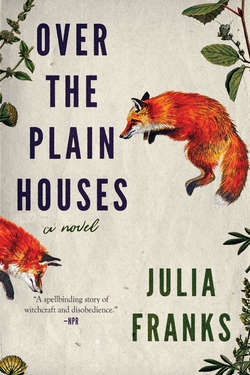Читать книгу Over the Plain Houses - Julia Franks - Страница 14
На сайте Литреса книга снята с продажи.
ОглавлениеCHAPTER SEVEN
BRODIS WOKE TO FIND THAT HIS WIFE WASN’T IN the bed beside him. His body felt her absence before his hand touched the empty mattress.
It was dead night. The fire in the stove had died down but not out. He listened for her step in the next room, but the silence there felt permanent. A minute passed, then two. Nothing. He threw back the covers. His feet hit the floorboards, and the cold grabbed him. Below the window, a square of light stretched across the floor, and that was where his legs took him. On the other side of the glass, the moon set down atop the privy. The building leaned over the creek branch. The door didn’t open.
Sear.
In the kitchen, familiar objects surfaced up from the shadows: pickling barrel, strings of hanging vegetables. The door of Matthew’s room had gapped, and Brodis treaded past, on habit lifting his lame foot against the possibility of splinters.
The lantern still hung by the door, but her brogans and coat were gone. The fingernail moon offered little light. He opened a lamp and struck a sulfur match. When the wick had finished guttering and flaring, he turned it down until it wasn’t but a yellow wing. Then he set to dressing.
Up the hill, the new-plowed field was barren, the furrows shadowed like the surface of some false and stagnant river. The barn was quiet but live, in the shifting breathing manner of creatures in repose. He slid open the stock door: manger and barley box, barrels of meal and sweetfeed, the bin of corn tops. He held the lantern aloft and peered into the mule box. Still there. Next door, the saddle horse whickered too. Wherever she was, she’d gone on foot.
Sear.
He peered up the stairs to the loft. “Irenie?” Nothing but the shadows of harness and plow lines, hames and singletrees, coils of rope.
Below the barn crouched the house, the mountains vague and hulking on three sides. He listened without knowing what for. It was as quiet as the first day of the world. She was out there somewhere, her slight form wrapped in the too-large coat, maybe nothing but a nightdress underneath. It was a good coat, an Army coat hand-me-downed from her brother. It came fair to her knees, but its blackness wouldn’t show against the night, wherever she was.
Or she wasn’t alone. Maybe there was somebody to walk beside her, someone lowhatted and slouch-shouldered, one hand buried deep in a pocket, the other at her elbow, touching.
The devil didn’t ever quit looking for a way in anymore. First the lady agent and the school, now this.
He stepped onto the porch, lifting his bad foot so as to stifle the sound of the drag. When he turned to ease the door shut, the latch slid down without a hitch, though he couldn’t remember the last time he’d oiled it.
The rack over the door held two guns. He touched the octagonal barrel of the Winchester, then lifted it from its supports and pushed the clip up from the bottom of the stock until it clicked. He checked the safety before he pulled back the bolt and then eased it forward, watching the bullet slide into the chamber, the sound of metal against metal cold and definite as daylight. With his thumb, he touched the safety again and stepped onto the porch. The yard looked the same, but darkened, stilled, waiting. He cradled the rifle across his torso, the heft of it solid against his chest. Nothing.
